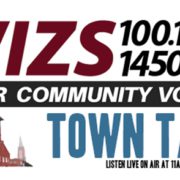TownTalk: “Hidden Helpers” Program Assists Veterans’ Families
Men and women who serve in the military have equipment to support the work they are called to do, whether they are participating in training exercises or whether they are deployed to battle.
But their families – especially children – sometimes need some special support when their parent returns home and family members find themselves in a caregiver role.
Melissa Comeau knows firsthand the importance of linking these “hidden helpers” with resources to help them as they provide care for their loved ones.
Comeau is the director of the Military Veteran Caregiver Network of the American Red Cross. This network offers peer-based support and services to those who are caring for injured, wounded or aging service members or veterans.
She and Phyllis Maynard talked about how the support network got started and how to access help Tuesday on TownTalk’s recurring segment “Former Active Duty, Still Boots on the Ground.”
The term “resiliency” has been batted around a lot lately, especially in light of the lingering COVID-19 pandemic.
Children are resilient.
And first responders are resilient, too.
Someone is resilient when he or she lives through a challenging time and comes out the other end, as good or better than before.
The Hidden Helpers project is a collaboration of several prominent organizations – the Wounded Warrior Project, The Elizabeth Dole Foundation among them – that provides a way for those caregivers “to come together and learn that they’re not alone,” Comeau said. Through Hidden Helpers, participants build relationships and find resources, she added.
Those relationships and resources were not so easy to identify when she was searching for help, however.
“I didn’t know I was a caregiver,” she acknowledged. A nurse who was caring for Comeau’s husband, himself a wounded Marine, who gave her that label.
“It opened up a new identity,” Comeau said, “but also a new idea of the support that I needed.”
She started looking around, “in all the usual places,” but wasn’t finding what the support she needed for someone who was the spouse – and caregiver – of someone with a traumatic brain injury and post-traumatic stress.
Her husband was able to get a medical retirement, through her efforts.
“This journey is so personal to me,” Comeau said. Not only does it offer another support stream for veterans, but also for the children growing up in these households as well.
Her son, just a toddler when she began this journey, is 11 now.
Children, though resilient, can suffer adversely when one parent is a caregiver to the other parent.
Whether it’s missing out on opportunities to interact with their peers, or experiencing anxiety or depression, the children sometimes suffer silently.
Through peer support and sharing, Hidden Helpers provides a platform for young people to express their feelings and share their own experiences with others who face similar circumstances.
The Hidden Helpers resiliency workshop is “aimed directly at children in caregiver homes,” Comeau said. “We took our best practices and lessons learned and built a resiliency workshop, all led by professionals licensed with mental health credentials.
The workshops are capped at 12 participants, who are grouped by age, she said. And all participants receive follow-up care, a critical ingredient in the process.
Whether in deployment, transition back to civilian life or needing a caregiver, Red Cross partners with other agencies to provide resources that aid service men and women and their families.
Hearing the stories and experiences of others plays a vital role in helping others find their voice and understand their own journeys.
The Hidden Helpers framework takes a holistic approach to “build supports that will help everyone, without them burning out,” she said.
“That creates a better outcome for everyone involved.”
The Hidden Helpers has an online community presence that is available 24/7, Comeau said.
To learn more, visit www.redcross.org/caregivers.
Additional links:
https://hiddenheroes.org/news/hiddenhelperslaunch/
https://sesamestreetincommunities.org/topics/family-caregiving/

